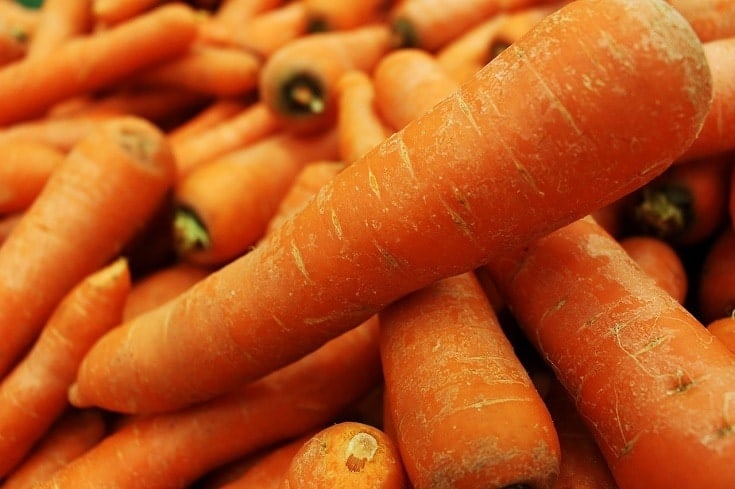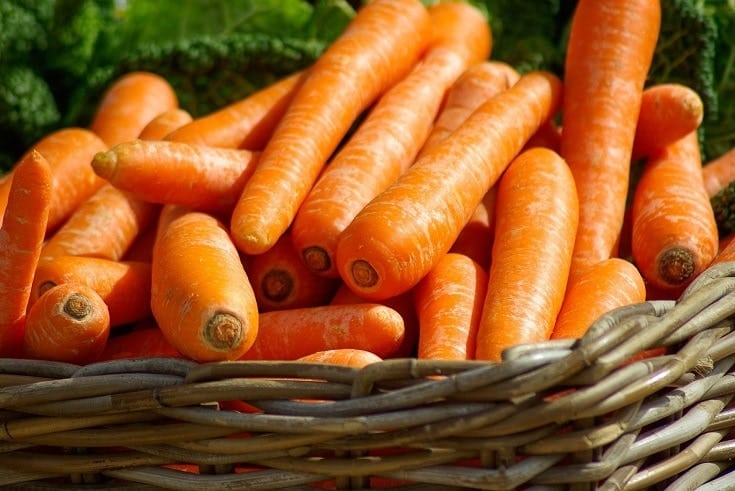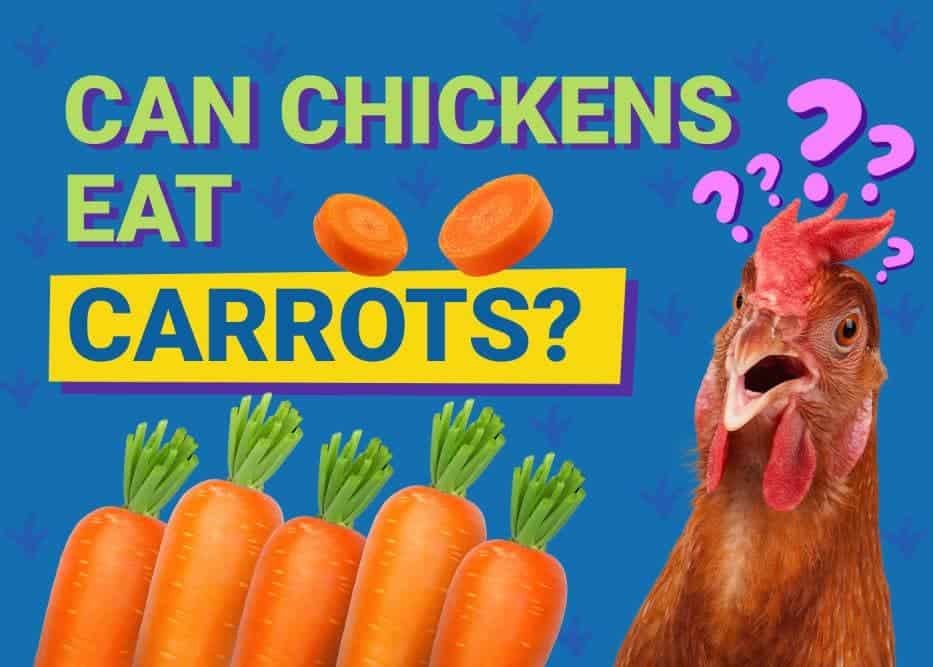Approved by Dr. Paola Cuevas
Chickens are omnivorous creatures with wide and varied appetites. Similar to dogs and people, chickens can eat a diverse selection of foods that includes fruits, vegetables, grains, proteins, and seafood. In fact, many backyard chickens eat a diet that consists of quite a bit of table scraps.
But that doesn’t mean that every fruit, veggie, or protein is safe for chickens to consume. If you’re raising chickens of your own, then you know how important it is to avoid feeding your chickens unhealthy or potentially toxic foods. Some seemingly innocuous foods, such as potatoes, could pose hidden threats to your chickens. Carrots, on the other hand, are a perfectly safe and potentially beneficial food for chickens to eat. Moreover, your chickens will love to eat carrots as a treat; occasionally or on a regular basis.

What’s In a Carrot?
Before we start talking about the potential benefits and risks of feeding carrots to your chickens, let’s talk about what carrots contain. A carrot is a vegetable that’s packed with quite a few nutrients.
Here’s what the nutrition information looks like for 100 grams of raw carrots:
| Raw Carrots | 100 grams |
| Calories | 41 kcal |
| Water | 88% |
| Carbs | 9.6 grams |
| Proteins | 0.9 grams |
| Sugar | 4.7 grams |
| Fiber | 2.8 grams |
| Fat | 0.2 grams |
As you can see, carrots are a relatively low-calorie snack that’s low in fat but contains a moderate amount of fiber. There’s a bit of protein in there as well, albeit, not a very large dose. Of course, this is just looking at the nutrition facts. What about the vitamins and minerals inside of a carrot?
Carrots contain quite a few important nutrients. In a carrot, you’ll find:
- Vitamin B6 – Helps convert food into usable energy so your birds can stay active all day.
- Vitamin K1 – Known more commonly as phylloquinone, vitamin K1 is essential for bone health and also plays a vital role in blood coagulation.
- Vitamin A – Carrots are packed with vitamin A and beta carotenes, which gets converted into vitamin A in your chickens’ bodies. They play a role in a maintaining healthy vision
- Glutathione – An important antioxidant that aids the overall health.

Benefits of Feeding Carrots To Your Chickens
Now that we know what nutrients make up a carrot, let’s discuss the potential benefits that these can provide for a chicken.
Fiber is essential for chickens, and carrots contain a decent amount; particularly a soluble fiber known as pectin. this soluble fiber maintains gut health by feeding beneficial gut bacteria. Overall, this leads to improved digestion, superior health, and a lower risk for many different diseases.
The many vitamins and minerals in carrots are also beneficial for chickens. Once converted into vitamin A, the beta-carotene in carrots can improve your chickens’ vision. Additionally, vitamin A aids in bone cell metabolism. This improves the strength of your chickens’ bones.
You’ll also find high amounts of glutathione in carrots. Essential for liver health, glutathione helps to prevent and repair damage caused to the liver by oxidative stress.
How to Feed Carrots to Chickens
For chickens, carrots are a sweet and delicious treat. They’re also not very picky eaters in the first place, so they’re not going to complain, no matter how you offer carrots to them! But seriously, you can serve carrots to your chickens in any way you’d like. They are safe for chickens when they’re completely raw or cooked.
That said, cooking carrots does kill some of their nutrients, so giving cooked carrots to your chickens might not provide as many of the beneficial nutrients that they’d get from eating carrots raw. But if you offer raw carrots to your chickens, make sure you wash them well. Carrots are often covered in chemicals and dirt when you get them, and you don’t want your chickens to eat pesticides and other harmful chemicals when you’re trying to give them a healthy treat.
With many animals, carrots can pose a choking hazard because they’re hard. However, chickens are not other animals, and they have strong beaks that can make easy work of a carrot. As such, it’s best if you offer carrots to your chickens whole, rather than chopping them into smaller pieces. Plus, if you give them whole carrots, they’ll have to work harder to eat them, keeping your chickens active longer.

Can Carrots Pose a Risk for Your Chickens?
Carrots have no known health risks for your chickens. However, it is always recommended to feed carrots along with other fruits and vegetables to your chickens. You should never feed carrots as a mono diet.
Are Carrot Greens Safe for Chickens?
Some plants are dangerous for chickens to eat, though their fruits are completely safe. Luckily, carrots aren’t one of these plants. Those dangling greens at the top of your carrots are nutritious and tasty to your chickens, and they’re perfectly safe for them to eat.

So, Can Chickens Eat Carrots?
The short answer is, absolutely! Carrots are not only a tasty treat for chickens, but they’re also healthy and can provide some nutritious benefits for chickens. This snack is low in fat and contains a decent amount of fiber. Plus, carrots are packed with vital nutrients like vitamin A, beta carotenes, potassium, and glutathione.
Even though there aren’t any health risks associated with feeding carrots to chickens, it’s still suggested that you use carrots as part of a varied offering of fruits and vegetables, rather than by themselves. Besides salads, you should ensure your chickens consume their commercial feed for a complete and balanced diet.
